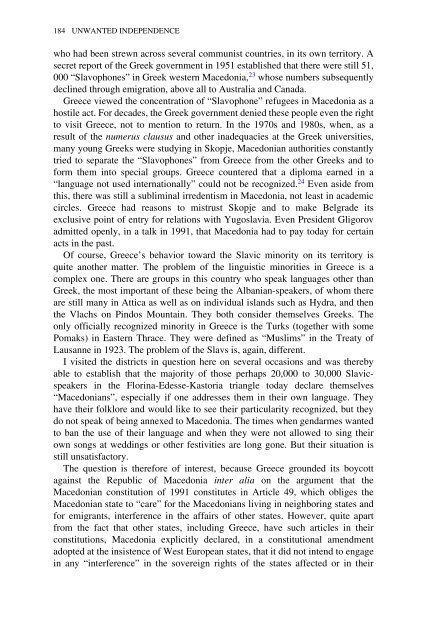Yugoslavia: A History of its Demise - Indymedia
Yugoslavia: A History of its Demise - Indymedia
Yugoslavia: A History of its Demise - Indymedia
You also want an ePaper? Increase the reach of your titles
YUMPU automatically turns print PDFs into web optimized ePapers that Google loves.
184 UNWANTED INDEPENDENCE<br />
who had been strewn across several communist countries, in <strong>its</strong> own territory. A<br />
secret report <strong>of</strong> the Greek government in 1951 established that there were still 51,<br />
000 “Slavophones” in Greek western Macedonia, 23 whose numbers subsequently<br />
declined through emigration, above all to Australia and Canada.<br />
Greece viewed the concentration <strong>of</strong> “Slavophone” refugees in Macedonia as a<br />
hostile act. For decades, the Greek government denied these people even the right<br />
to visit Greece, not to mention to return. In the 1970s and 1980s, when, as a<br />
result <strong>of</strong> the numerus clausus and other inadequacies at the Greek universities,<br />
many young Greeks were studying in Skopje, Macedonian authorities constantly<br />
tried to separate the “Slavophones” from Greece from the other Greeks and to<br />
form them into special groups. Greece countered that a diploma earned in a<br />
“language not used internationally” could not be recognized. 24 Even aside from<br />
this, there was still a subliminal irredentism in Macedonia, not least in academic<br />
circles. Greece had reasons to mistrust Skopje and to make Belgrade <strong>its</strong><br />
exclusive point <strong>of</strong> entry for relations with <strong>Yugoslavia</strong>. Even President Gligorov<br />
admitted openly, in a talk in 1991, that Macedonia had to pay today for certain<br />
acts in the past.<br />
Of course, Greece’s behavior toward the Slavic minority on <strong>its</strong> territory is<br />
quite another matter. The problem <strong>of</strong> the linguistic minorities in Greece is a<br />
complex one. There are groups in this country who speak languages other than<br />
Greek, the most important <strong>of</strong> these being the Albanian-speakers, <strong>of</strong> whom there<br />
are still many in Attica as well as on individual islands such as Hydra, and then<br />
the Vlachs on Pindos Mountain. They both consider themselves Greeks. The<br />
only <strong>of</strong>ficially recognized minority in Greece is the Turks (together with some<br />
Pomaks) in Eastern Thrace. They were defined as “Muslims” in the Treaty <strong>of</strong><br />
Lausanne in 1923. The problem <strong>of</strong> the Slavs is, again, different.<br />
I visited the districts in question here on several occasions and was thereby<br />
able to establish that the majority <strong>of</strong> those perhaps 20,000 to 30,000 Slavicspeakers<br />
in the Florina-Edesse-Kastoria triangle today declare themselves<br />
“Macedonians”, especially if one addresses them in their own language. They<br />
have their folklore and would like to see their particularity recognized, but they<br />
do not speak <strong>of</strong> being annexed to Macedonia. The times when gendarmes wanted<br />
to ban the use <strong>of</strong> their language and when they were not allowed to sing their<br />
own songs at weddings or other festivities are long gone. But their situation is<br />
still unsatisfactory.<br />
The question is therefore <strong>of</strong> interest, because Greece grounded <strong>its</strong> boycott<br />
against the Republic <strong>of</strong> Macedonia inter alia on the argument that the<br />
Macedonian constitution <strong>of</strong> 1991 constitutes in Article 49, which obliges the<br />
Macedonian state to “care” for the Macedonians living in neighboring states and<br />
for emigrants, interference in the affairs <strong>of</strong> other states. However, quite apart<br />
from the fact that other states, including Greece, have such articles in their<br />
constitutions, Macedonia explicitly declared, in a constitutional amendment<br />
adopted at the insistence <strong>of</strong> West European states, that it did not intend to engage<br />
in any “interference” in the sovereign rights <strong>of</strong> the states affected or in their
















